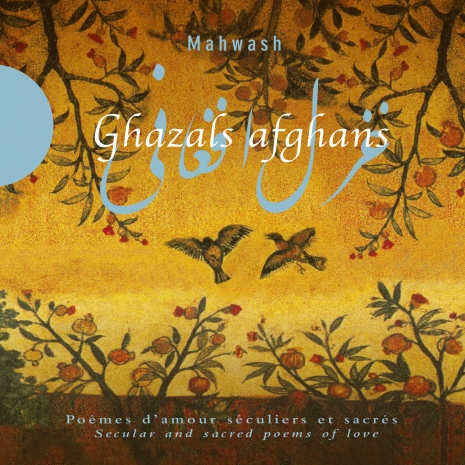
Ghazals afghans
Poèmes d'amour séculiers et sacrés // Secular and sacred poems of love
The legendary queen of ornamentation displays a rainbow of the most refined tone colours to express feelings of love.
After the album “Radio Kaboul”, a homage to the disappeared or exiled compositors and musicians of the radio of Afghanistan, Mahwash declines today the refined and complex forms of the feeling of love through the “ghazal”, privileged poetic frame of the human or devotional love.
Infinite arabesques of sense, metaphors, oscillations from oriental modes to Indian ragas, permanent sliding from the profane to the sacred... “It’s the game around the ambiguity of this love what distinguishes the great musicians. Their role is to make people hear the hidden sense of the verses” said Ustad Mahwash. Characteristic of the Muslim presence in South Asia and sound personification of the ambiguity, the ghazal is the place of the indirect discourse and of the collective imaginary of the Indo-Muslim society, to which Afghanistan is connected.
Mahwash is a legend in Afghanistan. She receives there the title of Ustad (master) in 1977. She leaves her country and goes to California, after the tragic events we all know. In the United States or in Europe, an enthusiastic public appreciates her voice with a slightly husky timber, but she refuses to return to Afghanistan to sing as long as the situation of women keeps them away from the musical world. An exceptional woman, she explains in the interview with Martina Catella the singularity of her situation: “In Afghanistan, we had many artists who sang mostly to divert. From the beginning, I decided to sing music that evokes noble feelings. Even in those days no woman frequented Kharabat, the musicians’ quarter. Women didn’t work. Society didn’t permit that. Thus, going to Kharabat or singing on the radio...you can imagine ! Their families forbade them to do that... I took that risk. I went to Kharabat with my husband to learn the rules of music. I am the first woman that followed this path. I learned the true Afghan music and the musical theory in a professional manner. Kharabat is our faculty of music. It is there where this art is transmitted in a professional manner from generation to generation...” (see the remainder in the booklet).
An essential album of poetry and history, together with a booklet full of texts of the expert in the subject, Martina Catella, and with the direct words of the artist with a strong temper.
Artistic direction : Martina A. Catella.
Distribution :
Ustad Mahwash : vocals
Ghalil Gudaz : sitar, harmonium, arrangements
Daud Khan Sadozai : luth sarod, rubab, arrangements
Gholam Nejrawi : zirbaghali
Prabhu Edouard : tablas
Henri Tournier : bansuri flutes, musical consulting
Martina A. Catella : artistic direction, texts
Collection VOX POPULI
CD - AC 118 - 2007
Harmonia Mundi

